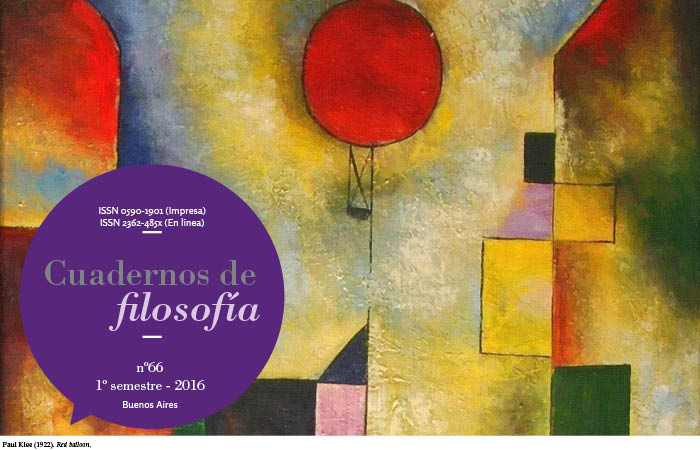La filosofía en la Facultad de Artes de París. La <i>Divisio scientiarum</i> de Arnulfo de Provenza
Abstract
The “college experience” performed by the Parisian Facultas artium has been reflected in the so-called didascalical works, which exhibit how philosophy is practiced and taught in the first half of the XIIIth century. In this regard, we will examine a) the influence of neoplatonic Scholastic in the philosophical development of the Late Middle Ages and b) the possibility to talk about the philosophy of the magistri artium, being both issues linked to one another. With respect to b), we will review De Libera’s and Lafleur’s positions, who discuss the conception of philosophy and the philosophical ideal proper of the XIIIth century in order to determine which the status of philosophy in the Faculty of Arts of Paris was and if it is or is not a Faculty of philosophy. On this basis, we will analyze a paradigmatic text in its kind, the Division scientiarum of the master of art Arnulf of Provence –especially the “Introdvctio” and the “Philosophia moralis”–, noting how pertinent the conclusions of both authors prove to be in this case. By means of such an analysis, we expect to show to what extent we can speak of the philosophy of the magistri artium, considering the late-ancient influence as much as the configuration and the claims for a certain way of life that is developed within the specific institutional framework of the Faculty of Arts of the University of Paris.Downloads
Los autores/as que publiquen en esta revista aceptan las siguientes condiciones:
Los/as autores/as [traductores/as] conservan los derechos de autor/a y ceden a la revista el derecho de la primera publicación, con el trabajo registrado con Licencia Creative Commons Atribución-NoComercial-CompartirIgual 4.0 Internacional, que permite a terceros utilizar lo publicado siempre que mencionen la autoría del trabajo y a la primera publicación en esta revista.
Los/as autores/as pueden realizar otros acuerdos contractuales independientes y adicionales para la distribución no exclusiva de la versión del artículo publicado en esta revista (p. ej., incluirlo en un repositorio institucional o publicarlo en un libro) siempre que indiquen claramente que el trabajo se publicó por primera vez en esta revista.
Se permite y recomienda a los/as autores/as a publicar su trabajo en Internet (por ejemplo en páginas institucionales o personales).
Políticas de detección de plagio
La colaboración de los y las editores/as, autores/as y evaluadores/as de esta revista y la guía de ética de los procesos editoriales se rige por los Principios de transparencia y buena práctica en publicaciones académicas del Committee on Publication Ethics (COPE) disponible aquí.
Todos los artículos enviados a esta publicación serán supervisados mediante una búsqueda online.







